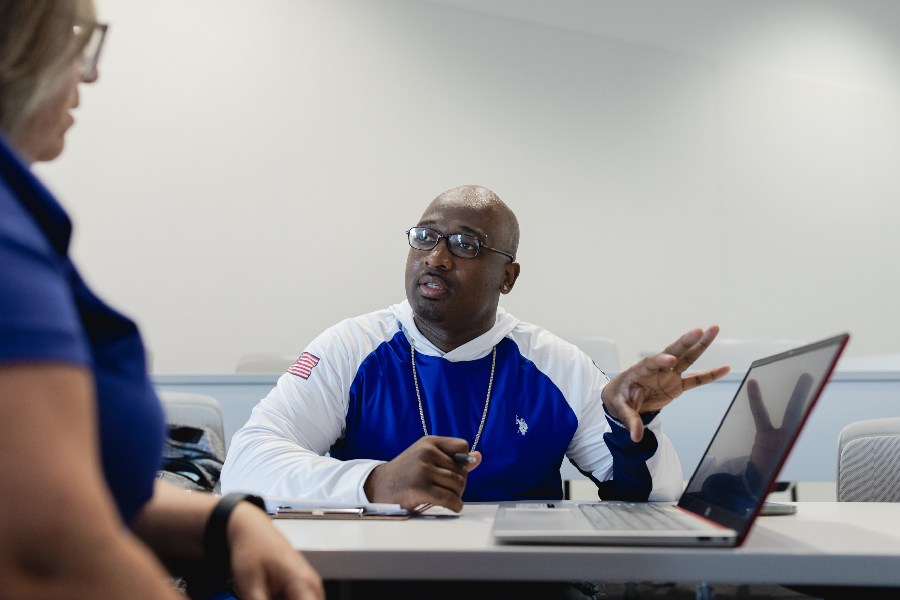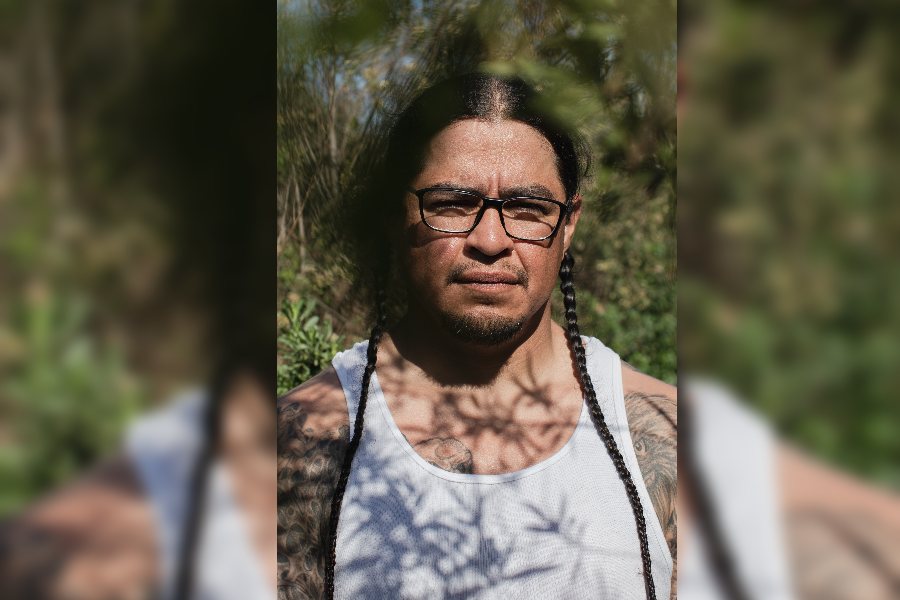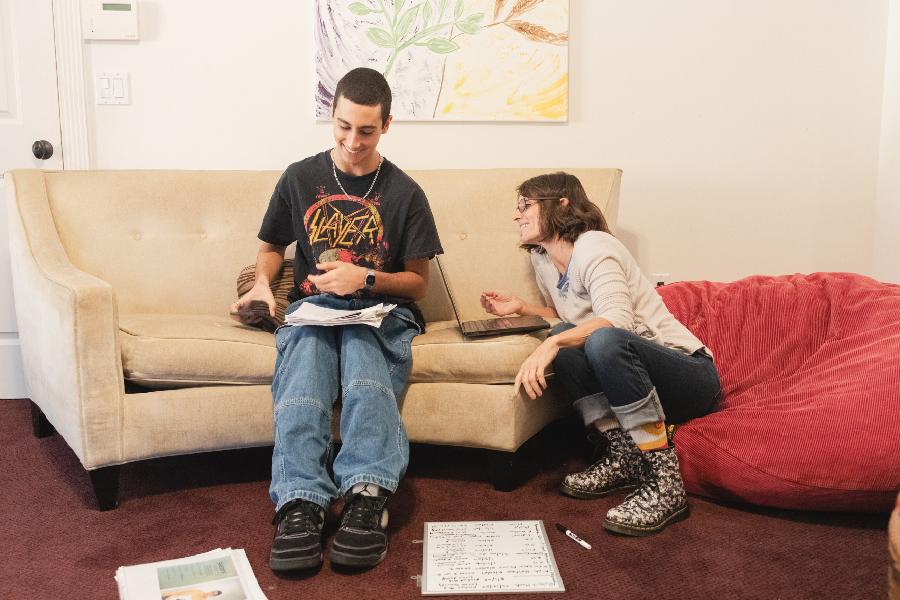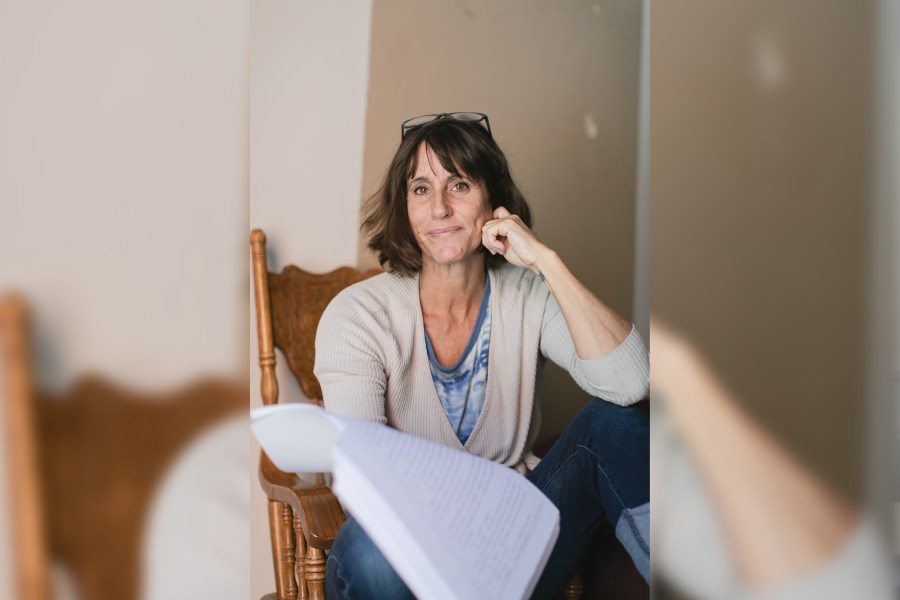Four years ago, as a deadly virus began to upend the world, Jessica Jacobs was at home in Los Angeles, in a wooded canyon that has long attracted bohemian types, and like many Americans was binge-watching true crime documentaries on Netflix.
One of them would change her life.
Watching an episode of “The Innocence Files,” about a Los Angeles man who served 20 years in prison for a murder he did not commit and the lawyer who freed him, Jacobs sensed she had found a calling. So she reached out to the lawyer, Ellen Eggers, and told her she wanted to help investigate cases like the one on the show.

Jofama Coleman, who was recently exonerated from his conviction in a drive-by shooting in 2003, speaks with a professor in his Politics and Public Policy class at the University of California, Riverside, in Riverside, Calif., March 7, 2024. Coleman plans to earn a law degree and then work on wrongful convictions. Alex Welsh/The New York Times
Eggers, a retired public defender who once worked for Cesar Chavez helping farmworkers become lawyers and now works on innocence cases for no fee, was skeptical of Jacobs’ overture. But she was overburdened with cases, and Jacobs was insistent. Eventually, she told Jacobs about the case of Jofama Coleman, which Eggers had learned about from Coleman’s ex-wife.
At the time, Coleman was confined to a cell in Corcoran, California, a town in the Central Valley with two main industries: farming and prisons. He had spent years in the prison library — learning the law, studying his case and filing motions asserting that he had nothing to do with the drive-by shooting in south-central Los Angeles for which he was convicted of being the getaway driver and sentenced to 25 years to life.
Getting nowhere with the courts and now dealing with a deadly pandemic behind bars, Coleman was losing hope. Out of despair, he shared his story online, hoping someone would read it and want to help him:

Abel Soto, who was recently exonerated from his conviction in a drive-by shooting in 2003, in Culver City, Calif., March 8, 2024. Inspired by true-crime shows that she binge-watched during the pandemic, a teacher, Jessica Jacobs, started working with a lawyer on cases that led to Soto and another man walking free after decades behind bars. Alex Welsh/The New York Times
“I’m a Black male who grew up in a single parent home with no wealth and platform. As such, the wrongs I suffer are easily swept under the rug. For over 5,890 days I’ve had to maintain my sanity as I fall asleep and wake up behind concrete walls and bars for a crime I did not commit.”
Coleman could not know then that help was on the way.
Working together, Eggers and Jacobs — with help from the students Jacobs teaches — got a key witness to recant and found another witness who claimed to know who the real killer was in the case. Crucially, they found an ally in George Gascón, the district attorney of Los Angeles, who has made reviewing problematic convictions a priority. And a legal motion that Coleman had filed to obtain the complete investigatory file of his case was granted by the California state Supreme Court.

Jessica Jacobs with Persius Bahri, one of the students in her nontraditional school, at her home in Topanga, Calif., March 8, 2024. Inspired by true-crime shows that she binge-watched during the pandemic, Jacobs started working with a lawyer on cases that led to two men walking free after decades behind bars. Alex Welsh/The New York Times
Late last month, a judge in Los Angeles declared Coleman an innocent man, a few weeks after he was paroled. Along the way, Eggers and Jacobs and their student helpers also exonerated Abel Soto, who had been found guilty in the same drive-by shooting and had been sentenced to 72 years to life. Soto, who was accused of being the shooter, was 15 at the time of the killing in 2003.
By the time Coleman heard from Jacobs inside prison, he felt as though he was out of options.
“She’s a firecracker,” he said in a recent interview on the campus of the University of California, Riverside, where, weeks after leaving prison, he was already studying public policy and planning to earn a law degree, and then to work on wrongful convictions. “Knowing that it got to the point to where they were on the case, and they were on it consistently, and I’m hearing from them every day, hearing from them every day, it gave me hope again.”
While Coleman, now 41, has been deep in his studies — he was up until almost 4 a.m. the other day writing a paper about police “stop-and-frisk” tactics — Soto, 36, has returned to his childhood home, a few blocks from the scene of the crime that took almost half his life.
He left prison with the clothes on his back and was handed a box of condoms, some Narcan and a $200 prepaid debit card. The other day, he was detailing a 1996 Suburban that his sister gave him, and has been taking his nieces and nephew to school every day. He said he might move to Mexico, where his parents came from.
“One thing that I haven’t gotten comfortable with, and I still have issues with, is a lot of choices,” he said when asked what adjusting to the world outside prison had been like for him. “Just choices, period. You go to eat, and there’s a menu.”
It will take work and time to overcome the trauma of imprisonment and anger over the injustice. “It was like a war zone,” he said. “It wasn’t no place for an 18-year-old kid.”
In rustic Topanga Canyon, not far from Malibu and the Pacific Ocean, Jacobs, who taught in public schools for years, started a nontraditional school called the Ditch School out of her home. The name stands for “Dare to Innovate and Transcend Cultural Hegemony.” Students can study what they wish, and many begin college courses at a young age. There is a yurt for play time.
“The idea of hegemony, that the people that are in power tell the rest of us a story so they stay in power,” she explained. “We are trying to transcend that.”
It was that spirit that spurred her efforts to free innocent people. Yet it would also spell the end of her partnership with Eggers, the former public defender who became the lawyer for both Coleman and Soto. The two women appreciate each other, but their approaches were ultimately at odds.
By her own admission, Jacobs is impulsive and has insisted on doing things Eggers says no legal advocate should do — like the time when she invited the homicide detective on Coleman’s case to give a talk to her students, when her real aim was to ask him pointed questions about the case.
Jacobs, 49, and her students plan to continue to investigate cases, and some of her former students have started their own innocence project called Youth For Innocence. On a recent afternoon at her home, there were transcripts of jailhouse phone calls that needed scanning and photo lineups of potential suspects that needed to be reviewed.
This being Hollywood, movie producers have already come knocking, Jacobs said. And she and Coleman have begun writing a book together.
“If one of the producers says we can get a book deal and a movie deal at the same time, that would be awesome,” she said.
The New York Times News Service











